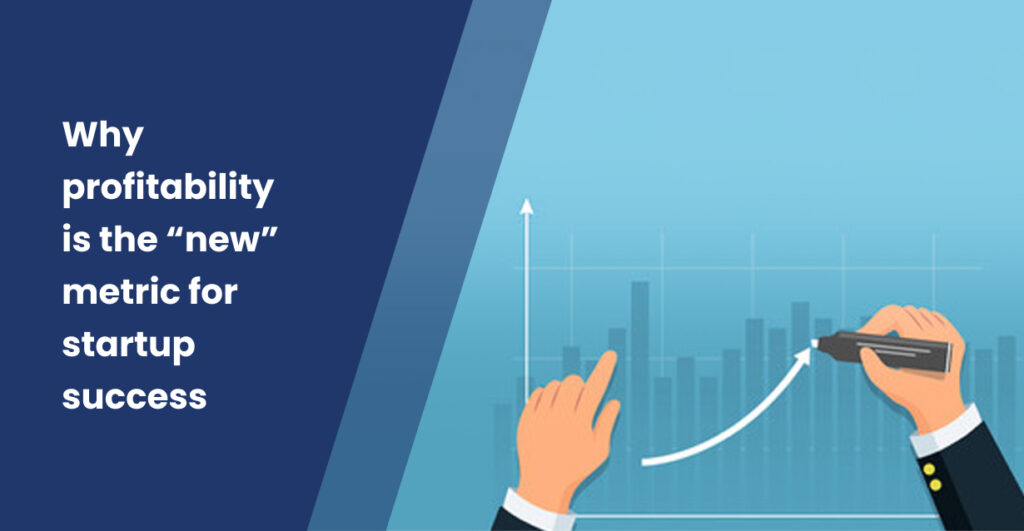Why profitability is the “new” metric for startup success
Founders who have ‘birthed’ their startup ideas in the last 10 or so years almost always begin with a focus on growing the company to gain market share while not worrying about other costs as much. It’s not just founders, either. Venture capitalists (VCs) of the last 10 years have focused almost entirely on growth.
That’s what a financial environment with lots of low-cost investment money will do to you. You look for the fastest path possible to scaling and a well-timed exit with substantial multiples of your invested capital returned and grown. Most startups failed in this environment, too, but the ones deemed successful got phenomenal growth toward an extremely positive liquidity event – IPO or corporate acquisition or purchase by a larger startup.
Private equity (PE) investors were the ones thought of as looking for a business plan toward solid, sustainable profits. Many of the plans included strong financial returns, but the focus was often making a profit while retiring leveraged purchase capital debt, reducing costs, and selling off undervalued assets. The PE fund was happy to continue owning the company for many years, not looking for an exit.
Venture capital startups, though, sought rapid growth in the hopes that once the startup has scaled big enough, profits will start to follow. The founder bootstrapping their startup with their own money and that of their family may have had more of a mind for holding the line on costs. Startups receiving VC money, though, had investors who expected rapid scaling while asking few questions about costs. That’s not always the way it’s been in venture markets and, in fact, is not the way it is today.
Growth is important; Profitability matters, too
An example of the need to think of profitability and cost control would be the dot.com bubble of the late 1990s. There were other underlying issues with that bubble then, but trying to get growth at all costs ultimately led to the demise of a lot of startups.
Founders must remember that companies cannot run on losses for a long time and expect people to cover them. Investors eventually would like to see profits signaling a return on their investment. Venture capital investors, as cheap money is not flowing, are stating hard expectations for cost control and profits.
Startups fail lacking cash, but also lacking new investment
Startups take 3-4 years to be profitable, on average. Only 40% of startups actually turn a profit; 44% of startups fail because they run out of cash.1 The biggest reason, however, that startups fail and must take into account profitability: 47% of startup failures are because there was a lack of financing/investors.
Not only is keeping any eye on profitability important for the company’s cash flows, but also those fuel growth and could eventually capture the interest of investors.
The growth at all costs mentality encourages startups to spend recklessly in pursuit of ever-larger user bases, quantity rather than quality, and little consideration given to the long-term sustainability of the business.2 These are some of the reasons for market bubbles which eventually burst.
Entrepreneurs must resist spending carelessly, especially if they are lucky enough to get investors to take a chance on their company. Entrepreneurs must also be transparent with stakeholders, especially with investors, and be accountable. Providing financial statements and regular communications to all that have a financial stake in your company is one way to be appropriately transparent.
By focusing on profitability, entrepreneurs can help their startups survive the economic slumps that are bound to turn up every so often. Keeping track of their bottom line to make sure the money isn’t being spent recklessly will allow for growth even in tough times. This will allow your startup to pay whatever debt you may have accumulated previously and eventually create free cash flow from current sales and show on your bottom line.
Profitability can generate trust with customers. Trust is almost impossible to build when customers wonder whether your company will be around in the future. With trust, customers have confidence to purchase your products because they know you will be around to help them if something goes wrong.
As businesses become more successful, they have a better opportunity to increase brand awareness and gain more customers. They can increase market share and reach a wider audience of potential customers.3
Path to profitability
How do you get to profitability – tough for any company, let alone a startup? You need to:
1) create a realistic business plan;
2) be disciplined about spending;
3) price your products or services correctly; and
4) focus on creating value for your customers.4
The company will make mistakes on getting to know what the customers would want.
With a mistake, you might need to eat the loss. To reduce mistakes, avoid:
1) poor planning;
2) lack of focus;
3) over-extending;
4) neglecting customers;
5) ignoring trends; and
6) not seeking advice.5
Profitability should always be near the top, if not first among your goals. That will lead to other goals being met more quickly and present other opportunities you hadn’t thought of.
1 20+ MUST KNOW STARTUP STATISITICS [2023]: AVERAGE TIME TO REACH PROFITABILITY AT A STARTUP, Chris Kolmar, Zippia The Career Expert, February 20, 2023, https://www.zippia.com/advice/start-up-profitability-statistics/
2 Why This Metric Should Be Prioritized Over Growth for Startup Success (In the world of startups, profitability has often taken a backseat to growth. Here’s why.), Will Fan, Entrepreneur, April 21, 2023, https://www.entrepreneur.com/growing-a-business/why-profitability-is-the-new-metric-for-startup-success/449670
3 Why profitability is the ultimate goal for your startup, Faster Capital, March 8, 2023, https://fastercapital.com/content/Why-profitability-is-the-ultimate-goal-for-your-startup.html
4 Fan, Entrepreneur, April 21, 2023, https://www.entrepreneur.com/growing-a-business/why-profitability-is-the-new-metric-for-startup-success/4496705 Faster Capital, March 8, 2023, https://fastercapital.com/content/Why-profitability-is-the-ultimate-goal-for-your-startup.html






